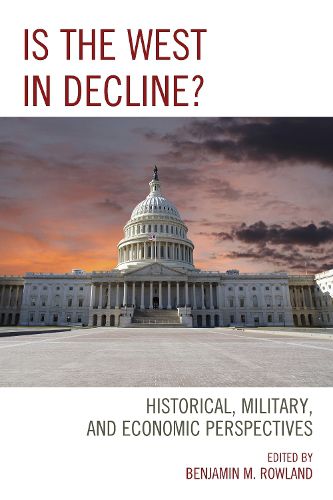Readings Newsletter
Become a Readings Member to make your shopping experience even easier.
Sign in or sign up for free!
You’re not far away from qualifying for FREE standard shipping within Australia
You’ve qualified for FREE standard shipping within Australia
The cart is loading…






Is the West in Decline? is a collection of ten essays by prominent scholars of international relations and current history, many of them associated with the European Studies program of the Johns Hopkins School of Advanced International Studies. The essays explore the question of decline from several perspectives: theoretical, historical, counterfactual, and contemporary. Thomas Row’s essay uses alternative history to show how an unfallen Habsburg Empire might have evolved into a state system resembling the European Union. Benjamin Rowland’s essay on Oswald Spengler considers how the German historian’s theory of decline could be applied to the West today. Several of the essays are country studies. Not all conclude that countries or state systems are in decline, or that the condition, if present, is irreversible. Writing about Germany, Stephen Szabo notes that only fifteen years ago, this currently robust country could have been seen as a clear exemplar of decline. Dana Allin’s essay on the U.S. asks whether a course change, including retrenchment and overseas rebalancing, might reverse decline or eliminate it altogether. David Calleo’s essay, among other things, looks at America’s reserve currency status as a principal sustainer of American exceptionalism, and asks what might happen should the U.S. lose its exorbitant privilege as reserve currency provider to the international system.
$9.00 standard shipping within Australia
FREE standard shipping within Australia for orders over $100.00
Express & International shipping calculated at checkout
Is the West in Decline? is a collection of ten essays by prominent scholars of international relations and current history, many of them associated with the European Studies program of the Johns Hopkins School of Advanced International Studies. The essays explore the question of decline from several perspectives: theoretical, historical, counterfactual, and contemporary. Thomas Row’s essay uses alternative history to show how an unfallen Habsburg Empire might have evolved into a state system resembling the European Union. Benjamin Rowland’s essay on Oswald Spengler considers how the German historian’s theory of decline could be applied to the West today. Several of the essays are country studies. Not all conclude that countries or state systems are in decline, or that the condition, if present, is irreversible. Writing about Germany, Stephen Szabo notes that only fifteen years ago, this currently robust country could have been seen as a clear exemplar of decline. Dana Allin’s essay on the U.S. asks whether a course change, including retrenchment and overseas rebalancing, might reverse decline or eliminate it altogether. David Calleo’s essay, among other things, looks at America’s reserve currency status as a principal sustainer of American exceptionalism, and asks what might happen should the U.S. lose its exorbitant privilege as reserve currency provider to the international system.